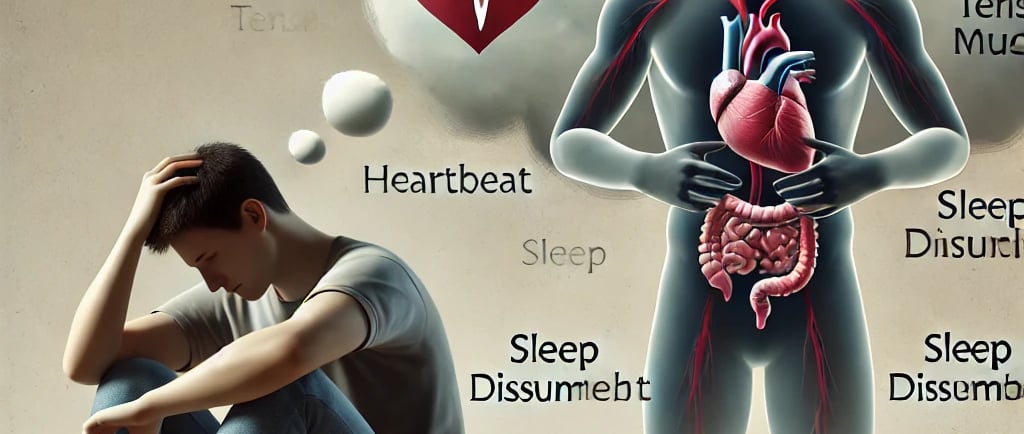The Dual Impact of Anxiety on Mental and Physical Health
Learn how anxiety impacts your mental and physical health, leading to symptoms like constant worry, irritability, sleep disturbances, and physical issues such as headaches and heart disease.
9/23/20244 min read


Understanding Anxiety: A Brief Overview
Anxiety is a multifaceted emotional response that encompasses feelings of fear, worry, and apprehension. It is often considered a natural reaction to stressful situations; however, when these feelings become excessive, persistent, or overwhelming, they may classify as an anxiety disorder. The definition of anxiety is not uniform as it varies across individuals—some may experience it momentarily in response to specific circumstances, while others may sustain a chronic state of anxiety that interferes with daily functioning.
Various types of anxiety disorders have been identified, including generalized anxiety disorder (GAD), panic disorder, social anxiety disorder, and specific phobias. Each type presents its own unique symptoms but typically involves an exaggerated response to perceived threats or challenges. The prevalence of anxiety disorders in contemporary society has significantly increased, with factors such as social media pressure, economic uncertainty, and global crises contributing to heightened anxiety levels.
The classification of anxiety within mental health diagnoses occurs through the Diagnostic and Statistical Manual of Mental Disorders (DSM). Professionals utilize this manual to understand and categorize anxiety symptoms effectively. Diagnosing anxiety disorders requires a comprehensive assessment that considers not only psychological symptoms but also physiological responses, which may include rapid heartbeat, sweating, or gastrointestinal discomfort.
Several underlying factors contribute to the experience of anxiety. Genetics play a significant role; individuals with a family history of anxiety disorders may be more predisposed to develop similar issues. Additionally, environmental influences, such as early childhood experiences, trauma, and exposure to stressors, can precipitate the onset of anxiety. Lifestyle choices, including substance use and diet, further complicate the landscape of anxiety. Understanding these contributing factors aids in demystifying the complexity of anxiety, positioning it as both a mental state and a physiological response that deserves critical attention.
Mental Health Consequences of Anxiety
Anxiety impacts mental health in various profound ways, often leading individuals to experience a range of distressing symptoms. One of the most common manifestations of anxiety is constant worry, where a person finds themselves preoccupied with potential problems or negative outcomes, such as health issues, job performance, or personal relationships. This nagging anxiety can develop into excessive rumination, making it difficult for individuals to focus on their daily tasks or engage in social interactions.
Irritability is another significant symptom linked to anxiety. Individuals may find themselves feeling on edge, leading to outbursts and strained relationships with family and friends. This emotional turbulence not only exacerbates anxiety but can also create a vicious cycle where social support diminishes, further isolating the anxious individual. Additionally, sleep disturbances are commonly reported; many individuals with anxiety struggle to fall asleep or stay asleep, leading to fatigue and a decline in overall cognitive function.
The progression of untreated anxiety can lead to more severe mental health issues such as depression and burnout. Chronic anxiety can deplete emotional resources, leaving individuals feeling overwhelmed and emotionally exhausted. This can create a persistent sense of hopelessness and despair, which aligns closely with symptoms of depression. Moreover, the cumulative effects of anxiety may culminate in burnout, a state characterized by extreme physical and mental fatigue, cynicism, and a reduced sense of personal accomplishment.
Given the significant mental health consequences of anxiety, early intervention and effective management strategies become essential. Recognizing the symptoms and understanding their potential progression is crucial in addressing anxiety before it escalates into more severe mental health disorders. Treatment options, including cognitive behavioral therapy and mindfulness practices, can offer valuable support in mitigating these effects and fostering resilience in individuals facing anxiety.
Physical Health Effects of Anxiety
Anxiety can significantly impact physical health, reflecting a complex interplay between emotional and bodily responses. When an individual experiences anxiety, the body often triggers the 'fight or flight' response, a physiological reaction that prepares an individual to confront or escape a perceived threat. This activation leads to a surge of adrenaline and other stress hormones, resulting in various immediate physical symptoms.
Common manifestations of anxiety may include a rapid heartbeat, muscle tension, headaches, and digestive disturbances. The heart races as blood is redirected toward essential muscles, ensuring preparedness for action. Concurrently, prolonged muscle tension can cause discomfort, contributing to conditions such as tension headaches or even migraines. Additionally, digestive issues often arise due to stress on the gastrointestinal system, leading to symptoms like stomach cramps, nausea, or altered appetite.
Beyond the immediate effects, long-term anxiety can have detrimental consequences for physical health. Continual exposure to stress hormones due to ongoing anxiety can weaken the immune system, rendering the body more susceptible to infections and illnesses. Moreover, chronic anxiety has been linked to an increased risk of developing long-lasting health issues, including high blood pressure, heart disease, and other cardiovascular disorders. These health risks underscore the comprehensive nature of anxiety's impact on an individual's well-being.
Furthermore, it is essential to recognize that the physical implications of anxiety extend beyond mere discomfort. Chronic anxiety may lead to lifestyle changes such as decreased physical activity or unhealthy coping mechanisms, further exacerbating physical health issues. Proper management of anxiety through therapeutic interventions, lifestyle adjustments, and stress-reducing techniques can be instrumental in mitigating these physical repercussions, promoting overall health.
Managing Anxiety for Better Health
Anxiety, a prevalent mental health issue, can profoundly affect both mental and physical well-being. Therefore, implementing effective management strategies is essential for mitigating its adverse impacts. Various coping mechanisms can enhance quality of life and improve health outcomes. One of the most prevalent methods is therapy, particularly cognitive-behavioral therapy (CBT), which systematically addresses negative thought patterns contributing to anxiety. CBT has demonstrated significant effectiveness in helping individuals reframe their perceptions and reduce anxiety levels.
Medication may also play a critical role in managing anxiety disorders. Medications such as selective serotonin reuptake inhibitors (SSRIs) and benzodiazepines are commonly prescribed to alleviate symptoms. However, it is important to consult with a healthcare professional to determine the most suitable treatment plan tailored to individual needs.
In addition to professional interventions, mindfulness practices, including meditation and deep-breathing exercises, can foster relaxation and reduce stress. These practices encourage individuals to cultivate present-moment awareness, effectively decreasing anxiety. Regular exercise is another vital component; engaging in physical activities not only promotes overall health but also releases endorphins, which act as natural mood lifters.
Lifestyle modifications significantly contribute to anxiety management. Establishing a balanced diet, ensuring adequate sleep, and minimizing caffeine and alcohol consumption can create a healthier environment for individuals struggling with anxiety. Furthermore, the integration of robust support systems is crucial. Engaging family, friends, or support groups provides emotional and social resources that can foster resilience and enhance coping ability.
Lastly, seeking professional help is paramount. Mental health specialists can provide tailored guidance and resources for effective management of anxiety, underscoring its importance in achieving better mental and physical health. Through a comprehensive approach combining therapy, medication, lifestyle changes, and support, individuals can navigate their anxiety more effectively, improving their overall well-being.



